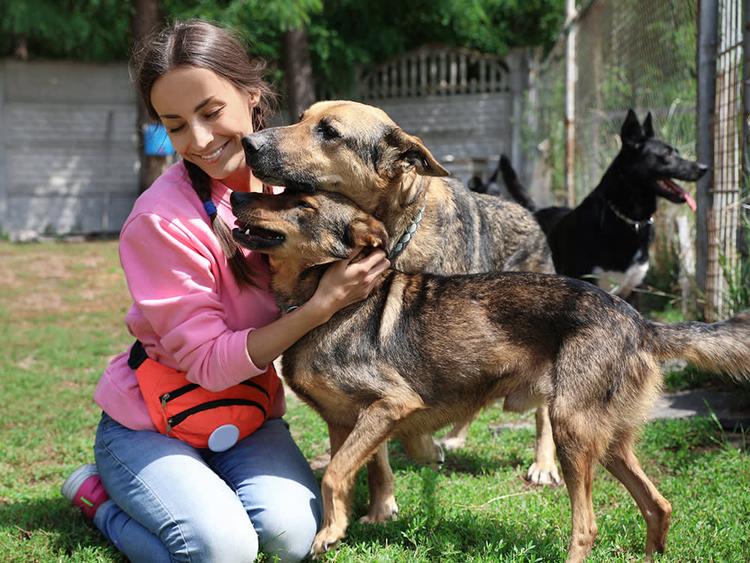35 Questions You Should Ask Before Fostering a Dog
Fostering comes with important responsibilities. Learn which shelter or rescue is right for you by asking these key questions.
Fostering comes with important responsibilities. Learn which shelter or rescue is right for you by asking these key questions.
by Janelle Leeson, | August 1, 2024

Jelena Jojic Tomic / Stocksy
Thinking about fostering a dog but not sure where to start? Maybe your head’s swirling with questions, or you’re unsure what to ask. No worries, we’ve got you covered.
Asking the right questions can help you decide if fostering a pet is a good fit, and help you find the perfect organization to work with. After all, each rescue or shelter might operate a little differently (or a lot) from the next. Here are some key questions inspired by real foster experiences, as well as some of the most commonly asked questions from potential foster parents like you.
Depending on where you live, there might be more than one organization you can foster through. If you’re not sure which to approach, consider recommendations from friends, family, or your veterinarian (if you have other pets at home). Additionally, you can search Adopt a Pet for shelters and rescues in your preferred radius. Once you’ve narrowed your choices down, you’re ready to get your questions answered.
Leah Massey, foster manager at Austin Pets Alive! says that even a temporary home can be a far better environment for many pets than a shelter kennel. That’s why shelters and rescues are always looking for foster homes. While they would love to include everyone who wants to help, they usually have some requirements and rules. Here are some questions you might want to ask them.
Is there a minimum age to foster? If so, what is it?
What’s the application process like?
Do you require a home visit?
Can I choose the dog I want to foster — or meet a dog before committing to foster them?
Can I foster if I rent? Which additional documentation may I need from my landlord?
Can I foster if I have other pets? What about if I have small children?
What supplies do I need to provide, and which supplies are offered by the rescue or shelter?
On average, how long do foster dogs typically stay with volunteers?
What educational support is available for foster parents?
How do you communicate with foster parents — email, text, message app?
How a shelter approaches their animals’ health is really important, whether you have other pets at home or not. Below are some questions to ask about a potential foster’s health.
Which tests do you perform to check for diseases, parasites, and overall health before placing a dog in a foster home?
Are dogs up-to-date on core vaccinations before entering a foster home?
Does this dog have any existing health concerns?
Do you have an in-house veterinarian or a designated veterinarian in the community for foster dog care?
Will I be responsible for any veterinary costs during the fostering period? Are there any limitations on covered expenses?
If the dog requires medication, will you provide it, or will I be responsible for purchasing it?
Does this dog require any special at-home care or accommodations due to their health?
“A dog can appear healthy in the shelter, but once they move to a new place, they could come down with a doggie cold or start showing other signs of illness,” Massey says. Choosing an organization with a strong support system means you’ll have the help you need from staff and volunteers if your foster gets sick.
Shelter staff do their best to assess each dog’s temperament before they’re sent to a foster home, “But a dog can act differently in a shelter environment, which can be loud, scary, and not have all the comforts of home,” Massey says. While this can make it challenging to place pups in the right foster home, asking questions about a dog’s history and observed behaviors can help. Here are some questions to start with, that could help give you an idea of a dog’s temperament.
How long has the dog been at the shelter?
Did the dog come from another home? If so, do you know the reason for surrender?
Was the dog a stray? If so, what progress have they made toward house training?
Does the shelter have any information about the dog’s past behavior with children, other dogs, or cats?
How would you describe the dog’s overall energy level?
What types of activities does the dog seem to enjoy?
How does the dog typically react to new people or situations?
Does the dog show any signs of anxiety, fear, or aggression?
Does the dog tend to bark excessively or have any other vocalizations?
How does the dog behave when left alone?
How do you think the dog will do with kids?
What resources are available if I feel like I need support or can’t handle the foster dog’s behavior?
Most dogs need three days to decompress in a new space, three weeks to settle in, and three months to feel truly at home (this is called the 3-3-3 rule). Even if your fostering period is shorter, be patient and provide a calm environment that will help prepare your foster pup for a smooth transition to their forever home.
Adoption is the goal, but it can be bittersweet. Here are six questions to ask about the adoption process.
What responsibilities do I have in providing photos and/or information for the dog’s online bio?
Who handles the screening of potential adopters and their applications? If the fosters sort through applications, what volume can we expect?
What is a meet-and-greet, and how will I be involved?
Can I provide any feedback on potential adopters?
What is the typical adoption timeline after a potential match is identified?
What if I want to adopt my foster dog?
Fostering a dog isn’t for the impatient, but it can also be an amazing experience when you are prepared. Plus, fostering is perfect if you really want a dog or puppy, but aren’t quite ready for such a big commitment.
To foster, you have to provide a dog with a safe space, love, and understanding no matter what. You’ll also need to devote some extra time to them. Taking care of any dog requires time, but shelter dogs, in particular, might have had a tough go before being rescued, so you need to be patient with them. If you’re prepared on all those fronts, fostering might be right for you.
Here’s how to get started.
Find the right organization: Start by exploring rescues and shelters in your area. Then, ask all your burning questions.
Get approved: Once you’ve found your ideal rescue or shelter, fill out the foster application and complete any other pre-fostering steps.
Get your home ready: While you wait to meet your match, puppy-proof your home and gather any supplies needed.
Welcome your foster pup home: When your foster arrives, stay calm and help them adjust to their temporary home. Your care will help prepare them for a happy life in their forever home.

Janelle Leeson is a Portland, Oregon-based freelance writer. Her work has been featured in magazines such as Inside Your Dog’s Mind, Inside Your Cat’s Mind, and Paw Print, as well online at Insider Reviews, NBC Select, Shop Today, PetMD, and Daily Paws. She has two adventure cats, a flock of urban chickens, and a soon-to-be-husband who doesn’t mind housing the occasional foster cat — or five.

Shelters & Rescue

Adoption Advice

Foster & Volunteer

Shelters & Rescue

Foster & Volunteer
Fostering is a great way to dip your toes into the pet-parenting waters, while helping a pet in need.

Adoption Advice
Considering renting with pets? Read more to learn about renter policies and how to navigate them.

Shelters & Rescue
Looking to adopt from a shelter? This guide will help you familiarize yourself with common shelter terminology about both the adoption process and pet profiles.

Adoption Advice
Foster fails aren’t bad — and they’re actually very common.

Shelters & Rescue
Debunk a few animal shelter myths and learn the benefits of adopting from a shelter or rescue group.